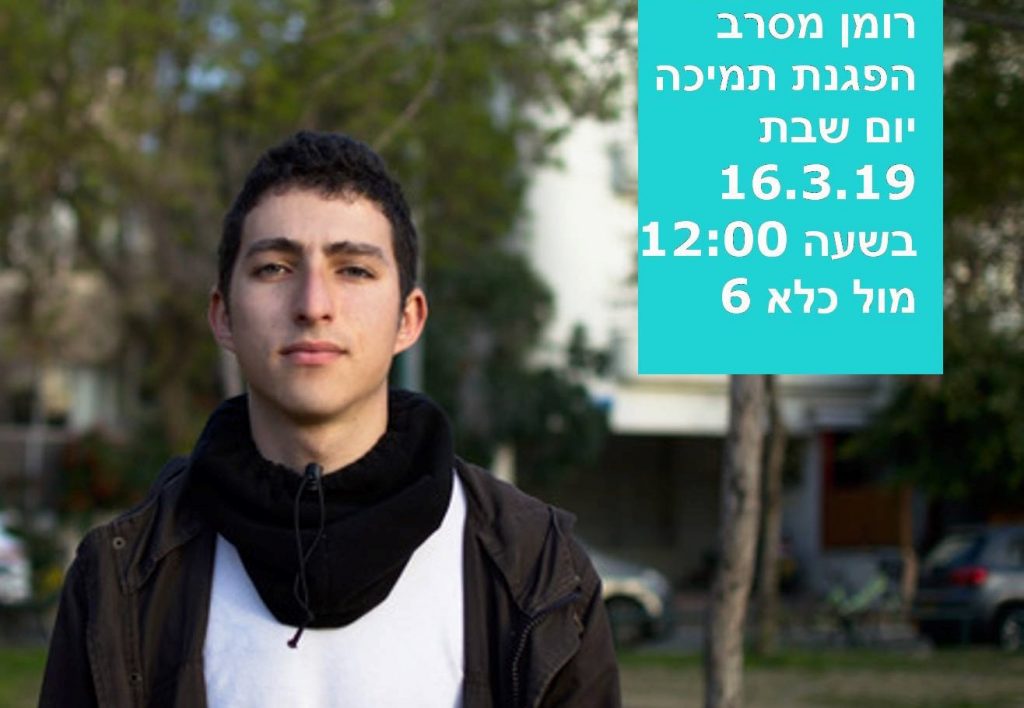A demonstration in solidarity with a young Communist soldier incarcerated in a military prison since last month had been scheduled to place on Saturday, March 16 at 12:00 outside Military Prison 6 in Athlit, south of Haifa. The Israeli army had initially sent Roman Levin there after he arrived at the military base near Lod where he had served for a year and a half and formally announced his refusal to continue any further military service. However, on Thursday, March 14, military authorities decided to transfer Roman to Military Prison 4 near Rishon LeTzion. It is speculated that Roman’s transfer to a different prison was motivated by the relative ease with which demonstrators can rally for and encourage prisoners locked up in Military Prison 6.

“Roman refuses to serve – Support demonstration, Saturday, 16.3.19, at 12:00 opposite Military Prison 6”
The topography around Military Prison 6 in Atlit – on the coastal plain between Tel Aviv and Haifa – gives refuser support activists an important advantage. Near the prison is a mountain, not very high as mountains go, but high enough that people standing at the top – waving banners and hands, shouting and chanting – are clearly visible and audible inside the prison compound. Thus the prisoner, fellow inmates and prison staff are all made well aware that this prisoner does not stand alone, but has an active support network on the outside; this has direct implication on the military authority’s decision on how long they intend to keep this prisoner behind bars.
The tradition of support demonstrations on the mountain opposite Military Prison 6 was established back in 1982, when hundreds of reserve soldiers and officers (among them several communists) refused to take part in the first Israeli invasion of Lebanon. It has been continued for numerous objectors, such as those who refused to take part in suppressing the First Intifada in 1988 and the Second one in 2000. Most recently it was put into practice on behalf of Levin, as it was last Saturday morning, March 9, when dozens of activists climbed the mountain, calling out “Roman, Roman, we are with you!” and waving a giant banner reading, “The Refusers are the True Heroes.”
On the morning of Monday, Feb. 25, activists mobilized by the Young Communist League of Israel (Banki-Shabiba), the Mesarvot Network and the Yesh Gvul movement accompanied Levin to the gates of the Ben Ami Transport Camp near Lod and conducted a support vigil there. Inside, Levin made his statement to presiding officers in which he stated:
“I have been serving as a truck driver, and many of these drives have been through the Occupied Territories. When I was drafted I thought the military serves the interests of the citizens of Israel, but after serving in the Occupied Territories, I have realized that what the army is doing there does not serve the my interests and those of all working Israelis; especially not after the continuous killing of the protesters on the Gaza fence.”
“I have come to the conclusion that one must choose – you cannot both object to the occupation, racism and capitalist order, and serve in the military that perpetuates these.”
After making his statement, Roman was subjected to an “instant trial” lasting about five minutes culminating with his being sentenced to 30 days in military prison. From earlier cases, it is expected that at the end of these 30 days, a second such “instant trial” will be held and he will be returned to prison.
In such “trials”, there is nothing remotely resembling due process – the accused cannot be represented by a lawyer or call any witnesses; the procedure is held in camera at the commanding officer’s bureau, with no access to the public or media and, as noted, it rarely lasts more than five minutes. There is no legal limit on how many times the army can repeat the procedure. Repeated 30-day sentences can accumulate into years of imprisonment, with no real legal process every being instituted. The only limit is in the amount of solidarity and public attention given to an imprisoned conscientious objector. Past practice has shown that, when a prisoner gets public attention and support, in Israel and abroad, the military authorities eventually let him or her go – though it often happens only after numerous repetitions of the “instant trial” routine.
Related: Army Jails Communist Soldier after He Refused to Continue to Serve


